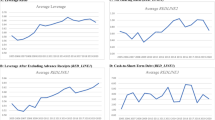Abstract
In year 2009, Thurner, Farmer and Geanakoplos construct an agent-based model of leverage asset purchases with margin calls. The interesting research shows that leverage could cause fat tails and clustered volatility. In this paper, we study the effects of leverage regulation regimes on financial markets based on their model, by introducing two types of leverage regulation policy: risk-based policy and incentive-based policy. Besides examining fat tails and clustered volatility stylized facts, we analyze macroeconomic indicators such as bankruptcy ratio, total social wealth and the efficiency of banking system for identifying prudential leverage regulation regimes.
Access this chapter
Tax calculation will be finalised at checkout
Purchases are for personal use only
Preview
Unable to display preview. Download preview PDF.
Similar content being viewed by others
References
Simkovic, M.: Secret Liens and the Financial Crisis of 2008. American Bankruptcy Law Journal 83, 253 (2009)
Fostel, A., Geanakoplos, J.: Leverage Cycles and the Anxious Economy. American Economic Review 2008 98(4), 1211–1244 (2008)
Thurner, S., Farmer, J.D., Geanakoplos, J.: Leverage Causes Fat Tails and Clustered Volatility. SFI Working Paper 09-08-031 (2009)
Feldman, T.: Portfolio Manager Behavior and Global Financial Crises. Journal of Economic Behavior & Organization 75(2), 192–202 (2010)
Friedman, D., Abraham, R.: Bubbles and crashes: Gradient dynamics in financialmarkets. Journal of Economic Dynamics and Control 33(4), 922–937 (2009)
Peters, O.: Optimal Leverage from non-Ergodicity. SFI Working Paper, 09-02-004 (2009)
Hodas, N., Tagliabue, J., Schmidt, M., Barofsky, J.: The Effect of Leverage on Financial Markets. Market Simulation Working Paper (2009)
Feldman, T.: Leverage regulation: An agent-based simulation. Journal of Economics and Business 63, 431–440 (2011)
Christensen, I., Meh, C., Moran, K.: Bank Leverage Regulation and Macroeconomic Dynamics. Bank of Canada Working Paper 2011-32 (2011)
Raberto, M., Teglio, A., Cincotti, S.: Macroprudential policies in an agent-based artificial economy. In: Workhshop on New Advances in Agent-based Modeling, Paris, France, June 19-20 (2012)
Mandelbrot, B.: The variation of certain speculative prices. Journal of Business 36, 394–419 (1963)
Author information
Authors and Affiliations
Editor information
Editors and Affiliations
Rights and permissions
Copyright information
© 2013 ICST Institute for Computer Science, Social Informatics and Telecommunications Engineering
About this paper
Cite this paper
Sun, C., Ding, W., Han, R. (2013). In Search of Prudential Leverage Regulation Regimes. In: Glass, K., Colbaugh, R., Ormerod, P., Tsao, J. (eds) Complex Sciences. Complex 2012. Lecture Notes of the Institute for Computer Sciences, Social Informatics and Telecommunications Engineering, vol 126. Springer, Cham. https://doi.org/10.1007/978-3-319-03473-7_29
Download citation
DOI: https://doi.org/10.1007/978-3-319-03473-7_29
Publisher Name: Springer, Cham
Print ISBN: 978-3-319-03472-0
Online ISBN: 978-3-319-03473-7
eBook Packages: Computer ScienceComputer Science (R0)




